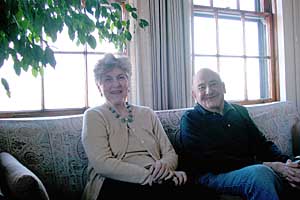A good time living the examined life: Rosenheims reflect on teaching at Chicago for more than half a century
By Seth SandersNews Office
 Margaret “Peggy” and Edward “Ned” Rosenheim will soon leave Hyde Park and the University community after their longtime careers of scholarship and their equally longtime friendships |
Some might say that Ned and Peggy Rosenheim are the University’s most typical couple—others could say they are the most unique.
Ned Rosenheim has studied and taught English here for almost 70 years. An expert on Jonathan Swift, he has done a good bit of satire himself, including musical comedy (see story on the Quadrangle Club Revels).
He also served as Director of Broadcasting (yes, Broadcasting) for the University during the 1950s when the “University of Chicago Roundtable”—a sort of “Hardball” with brains and a bit more patience—was syndicated over hundreds of radio stations in the United States, England and Canada.
Peggy Rosenheim, who became Dean of the School of Social Service Administration after earning her Law degree at Chicago, broke new ground in interdisciplinary research on welfare and juvenile justice. In the words of one of her award citations, “As a woman who forged an uncommon career in law, scholarship and public policy long before feminism was a byword,” she “has been a role model for generations of students.” This without bothering to graduate college first.
Whether unique or typical, the Rosenheims seem to embody certain values that frequently recur in the University’s history. This year, they will leave Hyde Park to join family in San Francisco. Their departure marks an opportunity to reflect on how much they have contributed to the University for 60 odd years.
Ned, or more formally Edward Rosenheim (A.B.,’39, A.M.,’46, Ph.D.,’53), the David B. and Clara E. Stern Professor Emeritus in English Language & Literature and the College, arrived in Hyde Park in 1935. Margaret (Peggy) Rosenheim (J.D.,’49), the Helen Ross Professor Emerita in SSA and Dean of the school from 1978 to 1983, arrived in 1945, and joined the faculty in 1950.
The two met in a now-nonexistent 53rd Street bar during her first year of law school. The man who introduced them, now a retired judge, considers it “one of the best things I ever did.”
Ned Rosenheim, who joined the faculty in 1947, is an internationally recognized authority on the life and works of Jonathan Swift. He has served as editor of Modern Philology and has authored two books, numerous articles and reviews, and a number of songs and scripts. He was a Guggenheim Fellow in 1967, and was honored with a Llewellyn John & Harriet Manchester Quantrell Award for Excellence in Undergraduate Teaching in 1953.
Margaret Rosenheim’s career has had similar highlights: In the words of the citation for her 1997 Norman Maclean Award, which recognizes “outstanding contributions to teaching and to the student experience of life on campus,” Rosenheim “has distinguished herself through pioneering research on policy affecting children and youth, juvenile justice, and the his- tory of social welfare policy.
Through the development of her own interdisciplinary teaching, she played an instrumental role in broadening the SSA curriculum. Rosenheim has consistently encouraged her students and colleagues to think broadly about the role of teaching and research in the larger University community.” She says the topic of her most recent publication from the University Press, A Century of Juvenile Justice, “has been a long-term concern of mine, starting with my first book.”
One course the Rosenheims describe as a highlight of over six decades at Chicago nicely captures the unpretentious way they together have illuminated complex and challenging subjects. This was the course they had team-taught for over a decade on Dependency and Disrepute, about why people tend to despise the poor and disadvantaged. It considered the various forms of hostility toward dependent people, using legal opinions as well as lyric poetry.
The course arose out of discussion between the two: “We recognized,” says Ned Rosenheim, “how often poetry and fiction reflected questions that interested (Peggy) professionally” as a scholar of welfare and juvenile law. “I constructed a list of imaginative works that might be illuminating, she came up with legislation, Supreme Court opinions and social science monographs,” and the syllabus was born. “We considered various areas of dependency—poverty, illness, mental disorder—and we always included old age, with an increasing sense of immediacy. We taught old age as the last block, ending in a powerful conclusion with King Lear.
“It can be a very interesting way of tackling some of the problems associated with dependency, which is historically a natural condition of most societies. And yet we like to think of ourselves as independent,” Ned Rosenheim continues, “and are very ambivalent about being dependent upon others. There is, more often than not, a stigma in our references to the dependent among us.” But time and history sometimes make people re-examine their views of dependence: “Such cataclysmic events as a major economic depression force people to reassess these things.”
An interest in the human condition that transcends academic boundaries seems to typify the approach of both Ned and Peggy Rosenheim. Ned Rosenheim comments, “To have shared the University experience with my wife for more than a half-century—and certainly to have shared the joy of teaching here—has been the happiest part of my career at Chicago.”
![[Chronicle]](/images/sidebar_header_oct06.gif)